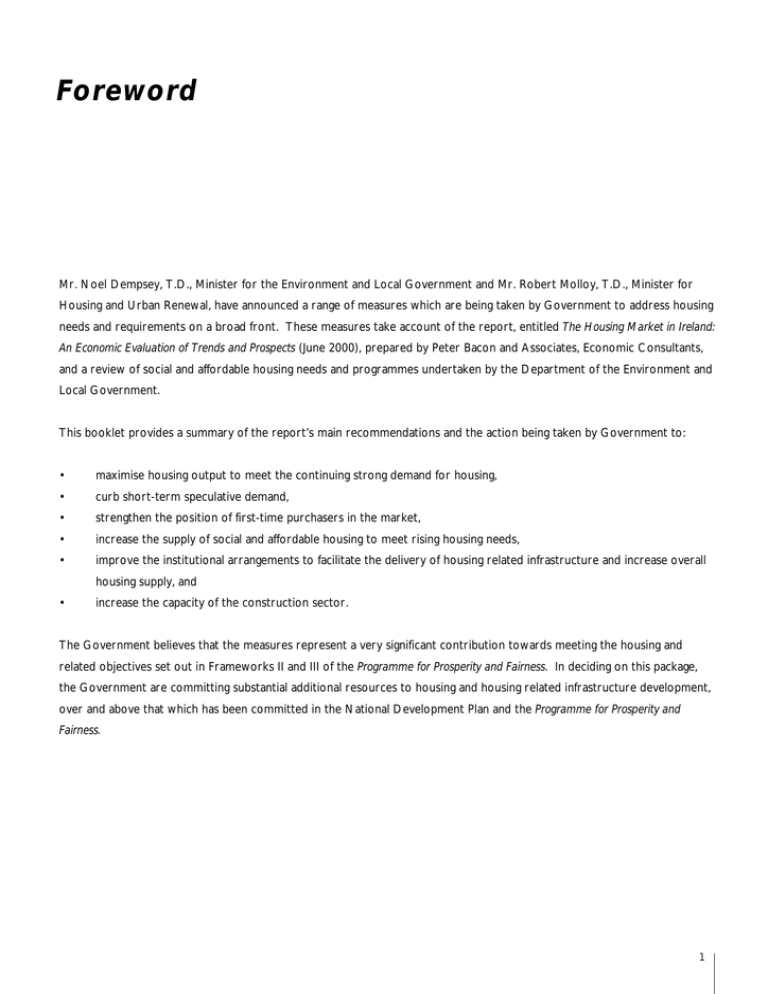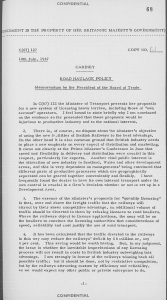Foreword
advertisement

Foreword Mr. Noel Dempsey, T.D., Minister for the Environment and Local Government and Mr. Robert Molloy, T.D., Minister for Housing and Urban Renewal, have announced a range of measures which are being taken by Government to address housing needs and requirements on a broad front. These measures take account of the report, entitled The Housing Market in Ireland: An Economic Evaluation of Trends and Prospects (June 2000), prepared by Peter Bacon and Associates, Economic Consultants, and a review of social and affordable housing needs and programmes undertaken by the Department of the Environment and Local Government. This booklet provides a summary of the report’s main recommendations and the action being taken by Government to: • maximise housing output to meet the continuing strong demand for housing, • curb short-term speculative demand, • strengthen the position of first-time purchasers in the market, • increase the supply of social and affordable housing to meet rising housing needs, • improve the institutional arrangements to facilitate the delivery of housing related infrastructure and increase overall housing supply, and • increase the capacity of the construction sector. The Government believes that the measures represent a very significant contribution towards meeting the housing and related objectives set out in Frameworks II and III of the Programme for Prosperity and Fairness. In deciding on this package, the Government are committing substantial additional resources to housing and housing related infrastructure development, over and above that which has been committed in the National Development Plan and the Programme for Prosperity and Fairness. 1 Measures to Increase Housing Supply RECOMMENDATION POLICY RESPONSE Use of Strategic Development Zones for Housing The Government should designate sites as Strategic Amendments were introduced at Report Stage to the Planning and Development Zones for housing under Part IX of the Development Bill, 1999, to make it explicit that Strategic Planning and Development Bill, 1999. Specific criteria should Development Zones (SDZs) can be used for residential be complied with in any assessment of potential SDZ sites, development with the aim of expediting the development of large- including the number of housing units and timescale of arrival, scale residential sites. Potential sites which meet objective criteria potential for comprehensive planning of land, the existence of and which are assessed as having the potential for earlier piped services or imminence/cost of new services, proximity development through the SDZ procedure will be designated by to existing/proposed public transport corridors and the need Government Order. to deliver high quality design and to ensure provision of ancillary facilities at appropriate development stages. Planning schemes can be made within 9-14 months, following designation of sites by Government Order, depending on whether a scheme is appealed to An Bord Pleanála. The Board will give priority to appeals on draft planning schemes for the zones. Planning applications in compliance with the scheme will be granted within two months of receipt by the local authority, with no leave to appeal to An Bord Pleanála. Levy on non-Development of SDZs An annual tax of £3,000 per potential housing unit site should The Government will introduce a land retention tax of £3,000 per be applied to the owners of land who: potential site unit per annum for development within SDZs as a (a) have not applied for planning permission in quid-pro-quo for fast-tracking planning and infrastructure provision. accordance with the approved planning scheme for Implementation of this tax measure will be dealt with in the lands contained within designated SDZs, within a Finance Bill, 2001, on the basis that designation of SDZs will only period of 12 weeks after the scheme has been occur following commencement of the Planning and Development approved; and/or Bill (expected in October 2000.) (b) do not commence implementing a planning permission in accordance with the terms contained therein, within 26 weeks of the permission having been granted. Establishment of SDZ Project Offices to Drive Infrastructural Development A series of Project Offices should be established in the local Experience to date has shown that implementation of projects on authorities, where SDZs are designated, to be responsible this basis can contribute to fast-tracking of infrastructure provision for, inter alia,: (e.g. North Fringe Sewer, Swords Sewage Treatment Works). • delivery of key water, sewerage and non-national 2 roads projects required to bring the SDZs into The Department of the Environment and Local Government, development, bringing the projects through planning proposes that a series of Project Offices be established under the RECOMMENDATION • POLICY RESPONSE to construction, management of the projects during aegis of the relevant local authorities on the basis recommended in construction, and management of any consultants the consultants’ report. Measures will be put in train to secure any appointed; necessary additional staff (engineering, planning, technician and assisting with the drafting of development contribution administrative staff) needed for these offices. schemes or other agreements for the SDZs; • liaison with public transport providers to ensure early delivery of key public transport projects; and • facilitating pre-planning discussions with developers. Similar structures should also be put in place to drive groups of key water and sewerage projects in the main urban areas for locations not designated as SDZs. Removal of Roads and Public Transport Infrastructural Constraints Quality public transport infrastructure is particularly The Government recognises the need for appropriate public important for releasing the full potential of the significant transport services to support key housing development and to areas of zoned and serviced land and would permit an secure the best return on available serviced land. To this end, the increase in densities, particularly in Cherrywood, Stepaside, Dublin Transportation Office (DTO) have been asked to quantify “The Gallops”, Ballyogan and Glencairn House (areas 20, 23, and cost identified public transport projects required to support 24 and 25 in Appendices 2-5, of the Report). housing development and to make provision for key projects in the DTI Update and in short and medium-term programmes which are In virtually all of the significant areas of potential housing, new currently being reviewed roads will also be needed to distribute traffic and to link them to the national network (e.g. Outer Ring Road in Lucan A standing committee, comprising the DTO, the Department of the South). Environment and Local Government, the Department of Public Enterprise, the Dublin local authorities and public transport providers, will be established to ensure integration of new housing development with proposed public transport infrastructure. The Government recognise the need for targeted investment in non-national road schemes crucial to housing development, and are urgently assessing a number of schemes, which will support development of a significant number of additional housing sites and other related developments. The overall additional roads investment involved is some £200 million over the NDP period of which £150 million will be provided by the Exchequer in particular for housing related roads investment. 3 RECOMMENDATION POLICY RESPONSE Removal of Water and Waste Water Infrastructural Constraints Key specified water and waste water infrastructural projects The Department of the Environment and Local Government essential for the release of housing land should be expedited. proposes to adopt a number of measures to address this issue: • a series of project offices for groups of key water and sewerage projects will be established; • existing wayleave procedures have been amended under the Planning and Development Bill, 1999, so that where a land owner’s consent to the laying of sewers or water mains is withheld, there will be leave to appeal to An Bord Pleanála – this will accelerate the existing procedures for securing wayleaves; • additional schemes will be approved under the Serviced Land Initiative – proposals with the potential to release 41,500 additional sites, on top of the current programme which will service over 100,000 sites, are under examination in the Department; and • key water and sewerage schemes which are essential for housing development will be included in the 2000 Water & Sewerage Services Investment Programme: - Leixlip to Ballycoolin Rising Main - £10m - Ballycoolin Storage Reservoir - £10m - Swords North Water Main - £5m - Balbriggan/Jordanstown Storage - £10m - North Fringe Water Main - £12m as well as other key housing related water and sewerage schemes outside the Dublin region. It is also proposed to develop a Greater Dublin Area Main Drainage Strategy Study. Improving the Deployment of Existing Planning Resources The Local Government (Planning and Development) Regulations will be brought forward to increase the size of Regulations, 1994, should be amended to increase the floor exempted domestic extensions from 23 sq. m. to 40 sq. m., which area of developments exempted from requiring planning will remove about 30% of extension permissions from the permission from 23 square metres to 40 square metres. planning system in major urban areas, and thus free up planners to focus on forward planning issues. 4 RECOMMENDATION POLICY RESPONSE Increasing Available Resources in the Planning System Special incentives should be provided to facilitate recruitment The Department of the Environment and Local Government will of professional planners from abroad. Assess prospective promote more widespread use of UK/EU consultants for forward manpower requirements for planning and identify Initiatives planning, emphasising expertise in high density design. to increase the supply of trained planners. Consideration will be given to the use of suitable private sector planning consultants to carry out development control on a fee per case basis. The Department will continue discussions with the Department of Education and Science and third level institutions on ways of producing more planners through the education system, including through the current planning courses in UCD and new courses under development by DIT Bolton Street. In the interim, to meet the short-term demand, the employment of planners from abroad on fixed term contracts will be pursued. The Department will also pursue with the local authorities and the Local Government Computer Services Board the use of information technology to streamline planning procedures. Returns from Local Authorities to the Department of the Returns Increasing Residential Densities If the findings of the forthcoming assessment of compliance Returns from local authorities to the Department of the with the Densities Guidelines indicate significant non- Environment and Local Government show that the majority of compliance, the Minister for the Environment and Local planning authorities either currently have policies in their Government should utilise his powers under Section 7 of the Development Plans, to implement the Guidelines, or are in the Planning and Development Act, 1992, or Section 9 of the process of reviewing their Development Plans to ensure compliance Planning and Development Bill, 1999, when adopted, to direct with the Guidelines. In the light of the September assessment, the Planning Authorities to adopt a more pro-active approach Department of the Environment and Local Government will towards increased density developments, which because of reassess the situation. their location, would contribute to the principles of sustainability. Such a Directive might be based on the Residential Density Guidelines for Planning Authorities issued by the Minister in September 1999, and incorporate the recommendations and safeguards, which they contain. 5 Demand Side Measures RECOMMENDATION POLICY RESPONSE Revisions to Stamp Duty Regime for Residential Property The existing stamp duty rates for secondhand houses bought by owner occupiers and for all houses bought by non-owner occupiers are: _____________________________________________ House Price Thresholds Rate Up to £60,000 Nil £60,001-£100,000 3% £100,001-£170,000 4% £170,001-£250,000 5% £250,001-£500,000 7% Over £500,000 9% _____________________________________________ Stamp duty thresholds and rates should be revised to ease the burden on first-time purchasers of second-hand houses, improve their position in relation to other owner occupiers and investors, and discourage speculative demand, especially at the lower end of the market. The following revisions are recommended: _____________________________________________ Purchase Price First-Time Other Owner Investors Thresholds Buyers Occupiers buying for own occupation _____________________________________________ Up to £100,000 Nil Nil 3.75% £100,001-£150,000 Nil 3.00% 3.75% £150,001-£200,000 3.00% 4.00% 5.00% £200,001-£250,000 3.75% 5.00% 6.25% £250,001-£300,000 4.50% 6.00% 7.50% £300,001-£500,000 7.50% 7.50% 7.50% Over £500,000 9.00% 9.00% 9.00% _____________________________________________ 6 Stamp duty rates for second-hand residential property will be revised as recommended in the case of first-time buyers and owner occupiers purchasing for their own occupation. In order to curb speculative demand, especially at the lower end of the market, the Government have decided that a flat rate of 9% will apply in the case of investors purchasing new or second-hand houses. The new rates are: _____________________________________________ Purchase Price First-Time Other Owner Investors Thresholds Buyers Occupiers buying for own occupation _____________________________________________ Up to £100,000 Nil Nil 9.00% £100,001-£150,000 Nil 3.00% 9.00% £150,001-£200,000 3.00% 4.00% 9.00% £200,001-£250,000 3.75% 5.00% 9.00% £250,001-£300,000 4.50% 6.00% 9.00% £300,001-£500,000 7.50% 7.50% 9.00% Over £500,000 9.00% 9.00% 9.00% _____________________________________________ The new regime will operate as follows: • The reduced stamp duty rates on second-hand houses and apartments will apply to conveyances dated on or after 15 June, 2000. • Stamp duty at the new flat rate of 9% will be charged on all conveyances of all new and second-hand residential properties bought by investors, giving effect to contracts entered into on or after 15 June, 200. The 9% flat rate will also apply to all such conveyances to investors executed after 31 January, 2001, regardless of the date of the contract. RECOMMENDATION POLICY RESPONSE Anti-Speculative Property Tax An annual tax of 2–3 per cent of the declared value of properties which are not principal primary residences should be introduced. Landlords should be exempted from these tax measures, where certain specified conditions apply, including compliance with the requirements of a regulatory regime and where there is evidence of a commitment to the availability of the accommodation for renting on a long-term basis. In view of evidence of increased speculative demand, in particular for short-term capital gains, an annual tax of 2% of the declared value of all newly acquired residential investment properties, for which contracts are signed on or after 15 June, 2000, will be introduced for a three-year period. The tax will be administered on a self-assessment basis, having regard to an annual valuation of the property. The annual valuation date will be 6 April with payment of tax due by 1 November immediately following the valuation date. Accordingly, the first payment of this tax will be 1 November, 2001. For this first year, the value of the properties for tax purposes would be the actual cost where the property was acquired between 15 June, 2000 and 6 April, 2001. Otherwise, and subsequently, the market value will apply. Exemptions will be available for landlords who comply with the standards and requirements of a proposed new regime for the private rented sector to be determined, following consideration of the forthcoming report of the Commission on the Private Rented Residential Sector. In the meantime, exemptions will be provided for landlords who comply with the Registration, Rentbooks and Standards Regulations provided for under the Housing (Miscellaneous Provisions) Act, 1992. Exemptions will also be provided in respect of qualifying residential investments under Section 23 Relief, the Town, Rural and Urban Renewal Schemes, Section 50 Relief (Student Accommodation), the proposed Living Over the Shop Scheme and rented residential properties under the Seaside Resorts and the Park and Ride Scheme. Exemptions will also be provided in respect of heritage homes, and registered and listed holiday homes. Exemptions will be provided in respect of gifts of residential property (where the property was acquired by the donor before 15 June, 2000) and also for inheritances. 7 Institutional Arrangements RECOMMENDATION POLICY RESPONSE Strengthening of Housing Supply Function The role of the housing supply function in the The resources and structures necessary to strengthen the housing Department should be expanded, which should ensure supply function within the Department and the Dublin local delivery of infrastructure in association with the local authorities will be agreed between the Minister for Finance and authorities and co-ordinate the delivery of other facilities the Minister for the Environment and Local Government and and services required for new housing development and between the Department of the Environment and Local provided by other relevant Government Departments and Government and the managers in the Dublin local authorities. A State agencies. Cross-Departmental Team on Housing will be established under the aegis of the Department of the Environment and Local The housing supply function in the Dublin local authorities Government and will report regularly to the Cabinet Committee on should also be strengthened to ensure there is a "One-Stop Infrastructure and Development. shop" for housing supply issues in Dublin. This is required to ensure that development is brought on stream in the designated SDZs at the earliest date and to oversee the project offices in the SDZs. It should report to the Department each quarter on implementation of the housing strategies, covering house completions (private, local authority and voluntary housing sectors), serviced land status, planning permissions granted, progress on key housing - related water, sewerage, roads and public transport projects (compared to the original critical paths), constraints on achievement of the housing strategy targets and any adjustments to factors underlying the strategy, etc. 8 Social and Affordable Housing Measures Increase the Local Authority Housing Programme The Government will increase the number of local authority housing starts under the National Development Plan (NDP) from 35,500 to 41,500 units i.e. 1,000 extra in each year from 2001 to 2006. The four-year multi-annual programme which commenced this year will increase from 22,000 to 25,000 starts. Facilitate Land Acquisition for Social and Affordable Housing A number of measures will be taken to facilitate local authorities and approved voluntary and co-operative housing bodies to acquire sufficient land to enable them to meet the targets set under the National Development Plan (NDP) for the provision of social and affordable housing. Legislation will be introduced to: • increase the borrowing limit of the Housing Finance Agency from £1.5bn to £5bn, • enable the Agency to lend for a range of non-housing functions as currently proposed in the Local Government Bill, 2000: this will also facilitate local authorities with the provision of housing infrastructure, and • enable the Agency to lend directly to certain approved voluntary and co-operative housing bodies as the Minister may determine. The cost of acquiring land in advance, along with the rolled up interest charges imposes a considerable financial burden on local authorities and voluntary housing organisations. The following changes will be made to the charging of site costs and interest charges: • under the local authority housing programme at present, site costs together with the rolled up interest charges up to a period of five years are charged to individual schemes when the sites are developed - this period will be extended to seven years in line with the timescale of the NDP, • similar arrangements will be made to increase the period for the affordable housing scheme to seven years and to extend the provision to new build under the shared ownership scheme, and • the rolled up interest charges on funds provided to voluntary organisations for the purposes of acquiring land for housing will be paid for up to five years. Improve the Affordable Housing and Shared Ownership Schemes The Department of the Environment and Local Government will improve these schemes as follows: • • • • • The income limits for both schemes will be reviewed to take account of pay rises and house price increases. The income eligibility limits for both schemes will be increased to £25,000 for a single income household, with a pro-rata increase for two income households (i.e. two and half times the first income plus once the second, subject to a maximum of £62,500). The mortgage and rental subsidy levels will be reviewed in line with the increase in income limits. The corresponding increases in the subsidy levels will allow households with a gross income of £20,000 or less in the preceding tax year to qualify for a mortgage subsidy under the Affordable Housing Scheme and a rental subsidy under the Shared Ownership Scheme, and the amount of subsidy will be increased by up to £400 per annum at the different subsidy levels. A site subsidy of up to £30,000 in major urban areas and £25,000 in other areas will be provided for the new Affordable Housing Scheme to enable local authorities to provide houses at an affordable price and at a sufficient discount from market values. The Sites Subsidy Scheme will also apply to houses built for sale under the Shared Ownership Scheme. A clawback will be provided under the existing Shared Ownership Scheme for new build houses sold at less than the market value and to bring it and the Affordable Housing Scheme in line with the equivalent provisions under Part V of the Local Government Planning and Development Bill, 1999. The current local authority loan limit will be increased to £100,000, to standardise the procedures and to simplify its administration by local authorities. Current loan schemes in operation by local authorities provide that in the case of: an ordinary house purchase loan, the maximum is £50,000 (used generally by those building their own houses; a mortgage under the Shared Ownership Scheme, the original limit is £50,000 but this increases as additional equity is purchased; and a mortgage under the Affordable Housing Scheme, the loan is 95% of the cost of the house, subject to purchaser’s ability to repay by reference to net income of household (mortgage repayments up to 30% of net (i.e. after tax + PRSI) pay are considered). 9 Increase the Site Subsidy for Voluntary Housing The Government will increase the funding available to approved voluntary bodies for site acquisition from £20,000 to £30,000 in major urban areas and from £15,000 to £25,000 in all other areas. As indicated above, legislation will be introduced to enable the Housing Finance Agency to lend directly to such approved voluntary housing bodies as the Minister may determine. Increase Mortgage Allowance The existing mortgage allowance of £4,500 over 5 years, available to social housing tenants purchasing private housing, will be doubled to £9,000. The scheme assists social housing tenants or tenant purchasers to buy or have a private house built with a mortgage loan. The allowance is paid directly to the lending agency and reduces the mortgage holders’ payments in each of the first five years of their mortgage. Examine Alternative Methods of Construction and Contract Procurement The Department of the Environment and Local Government will, in co-operation with local authorities examine various suitable alternative methods of construction and contract procurement. This will assist in ensuring that the potential advantages of alternative methods of construction and contract procurement in alleviating capacity constraints, reducing construction time and making local authority tenders more attractive to builders are utilised to the greatest extent possible. Provide Assistance in Relation to Private Rental Accommodation The potential of more supply-focused approaches to rental assistance including possible arrangements and measures needed to promote improvements in standards and supply of rent-assisted accommodation will be explored. A Planning Group under the aegis of the Department of the Environment and Local Government is currently formulating proposals for a local authority scheme of private rental assistance. While the Planning Group’s work is at an early stage, it appears in principle that there may also be potential to refocus the approach to rental assistance away from the largely welfare-payment character of the Supplementary Welfare Allowance (SWA) scheme and towards greater emphasis on the supply of good standard private rented accommodation. This could involve, for example, more direct arrangements or partnerships between local authorities and landlords or investors. It is proposed that the Planning Group should specifically explore this approach further as part of its review. Encourage More Efficient Utilisation of Existing Housing Stock A number of measures will be implemented to promote more efficient utilisation of existing housing, to remove any identified barriers to the efficient use of the existing housing stock and to meet, in particular, the housing needs of the elderly more appropriately. • Local authorities, particularly in urban areas, will be encouraged to construct smaller dwellings in appropriate locations with a view to earmarking them for elderly people, currently in accommodation inappropriate to their need. • The Minister for Health and Children will request the Chief Executive Officers of the Health Boards to consider the disincentive effect of loss of medical card eligibility on decisions made by the elderly to move to more appropriate accommodation. CEOs will be asked to consider the positions of persons in receipt of a medical card before selling their home but who could lose their entitlement, arising out of capital held following the sale of their home. • The Minister for Social, Community and Family Affairs will increase the amount of net proceeds of sale of a home exempted during assessment of means for non-contributory pension purposes from £75,000 to £150,000 and will examine extension of the eligibility for the exemption to those taking up housing provided by local authorities and voluntary housing bodies. • The National Building Agency will pilot a home ownership sheltered housing development for elderly private homeowners wishing to purchase housing more suitable to their needs within their community and locale. The pilot will serve as a demonstration model which can be taken up by the private house building sector and local communities throughout the country. 10 Other Measures Increase the Capacity of the Construction Sector Increased resources will be required by the construction industry to deal with the level of house building activity required along with the demands of the National Development Plan. The Forum for the Construction Industry (FCI) is due to report by end July, on measures to expand the capacity of the construction industry. The final report will address measures to: • remove skilled labour constraints; • reduce shortage of Building Professionals/Planners; • improve building efficiency to release significant wastage of existing labour and materials on site; • encourage research, development and application of innovative building methods, materials and plant; and • improve the Legal/Regulatory/Institutional Framework and related public service manpower resources for supporting the construction process and infrastructural investment programmes under the National Development Plan. The Government will urgently examine and support the implementation of recommendations of the Final Report by the FCI on increasing the capacity of the industry. As already stated, steps are being taken to increase, and to improve on the deployment of resources in the planning system, and measures will also be taken to meet the training needs of some 5,000 construction industry apprentices. Tax Measures to Bring Forward Development of Serviced Land The Tax Strategy Group, in consultation with the Department of the Environment and Local Government, will examine the scope for and implications of further tax measures designed to bring serviced zoned residential land into development. Any proposals arising from this examination will be considered in the context of Budget 2001. Register of State Lands The Government will establish a comprehensive register of State properties and land holdings, which will assist in ensuring the best use of such assets, including the release of surplus State lands for housing. The Register will be completed by end2000 and will contain comprehensive data on State holdings (land and buildings). Urban Renewal Initiatives The tax incentive-based Urban Renewal Scheme, which runs to the end of 2002, and the Town Renewal Scheme, which is the subject of legislation before the Oireachtas at present, will target areas of dereliction in core areas in the major cities and smaller towns respectively. The schemes will have a significant impact in boosting housing supply in the areas benefiting from tax incentive designation status. Tax incentives encouraging residential development, particularly the refurbishment of existing properties, are available under both schemes. It is intended to announce designations under the Town Renewal Scheme in July 2000. A new Living Over the Shop scheme which is aimed at tackling the problem of vacant upper storey space in major urban areas will be introduced. The scheme which is tax incentive-based, has the potential to release a significant number of residential units in high demand areas, particularly in Dublin. 11 Summary Table of Additional Exchequer Costs A: Housing Supply Measures ___________________________________________________________________________________________ Measures 2000 Total Costs Total costs (2000-2002) (over NDP) £m £m £m ___________________________________________________________________________________________ Non-National Roads Schemes supporting residential and other developments Water Services Prog. & Serviced Land Initiative1 4.0 74 150 - - - ___________________________________________________________________________________________ 1No additional funding required under either scheme - expenditure being reprofiled B: Demand Side Measures ___________________________________________________________________________________________ Stamp Duty Regime 5.0 25 65 ___________________________________________________________________________________________ C: Social Housing Measures ___________________________________________________________________________________________ Increase in Local Authority Housing Starts - 91 4902 14.5 79.8 249.8 - 16.5 91 0.06 0.66 2.2 0.2 0.6 1.4 Affordable Housing/Shared Ownership schemes site subsidy for new build Increase in site subsidy for Voluntary Housing Increase in Mortgage Allowance Revision of income and subsidy limits of SOS/AHS (current expenditure) ___________________________________________________________________________________________ 23.76 287.56 1049.4 TOTAL ___________________________________________________________________________________________ 2Some 12 carryover costs in 2007-2008 - approx. £99m.



